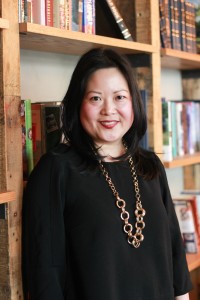Helen Wan’s ‘The Partner Track’ is no ‘Joy Luck Club’–And Thank Goodness for That By Dana Ter and Photos by Jackie Ho

There’s a scene from The Partner Track when the protagonist is gossiping to her best friend over brunch in an Upper West Side café near Columbia University about the previous night’s escapade with a handsome co-worker. It is a quintessential representation of the life of a young, sophisticated career woman living in New York City circa 2013.
So should it matter that the book’s protagonist, Ingrid Yung, is an Asian American woman? According to author Helen Wan, the answer is both yes and no. It should not matter because (surprise!) Asian Americans do normal things, and yet a story like this has not been told before. It is always a soul-searching trip to China, she said, or a setting in Chinatown where the character lives above a Chinese takeout place.
Why not make Ingrid blonde then, a publisher had asked Wan. Since the story is about anyone, right? Wan refused, insisting that it would detract from the entire purpose of the book. “A huge misperception from people who have not read the book,” Wan explained, “is that it’s a rant against blatant racism.” But far from that, The Partner Track explores the subtleties and nuances that inherently comes with being the only Asian American female lawyer in a senior position at a prestigious Manhattan law firm.
Wan wanted to expose the little things. “A lot of people have been put in situations where conversations are exclusionary in nature,” Wan elaborated. This has sometimes been the case in her own experience at cocktail parties and expense lunches. “Once I was at a lunch where everyone at the table was talking about a sailing club in Connecticut, and knowing nothing about sailing, I tried to steer the conversation in another direction.”
The little things are more acute for Asian American women like Ingrid who have to overcome both their gender and minority status in order to succeed in a setting like Parsons Valentine & Hunt LLP. “In such a situation, there are two weapons that one needs in their arsenal,” Wan said. “Number one is a quick and ready sense of humor. The second is the ability to pick one’s battles wisely.” So when asked where she’s from, Wan says “D.C.” When asked where she’s really from, she says “California,” and when questioned where her parents are from, she replies, “Sacramento.” She sees these instances as good opportunities to “prick at people’s brains.”
Like Ingrid’s family, Wan’s parents moved to the U.S. from Taipei, Taiwan. All of this is important to Ingrid, but her race and family history are not the only aspects that characterize who she is. “My intention was to write the book as a page-turner, infusing elements of suspense and drama in order to depict the reality of everyday life in a big city,” Wan said.
That she succeeds at doing. The novel is as fast-paced as New York City itself, a place where almost every young person seems to be juggling work, romance and a social life. Wan said that Murph, Ingrid’s love interest and topic of conversation over brunch, was her favorite character to write. A real ladies’ man, Murph is the perfect partner for Ingrid, yet also her foil. Wan’s own opinions toward dating are similar to Ingrid’s — she believes that the limits women put on themselves prevent them from having a relationship. “Successful career women tend to feel that they can only date someone on par with them or higher,” she said, “while men like Murph are entitled to date anyone.”
Plots with office trysts make for good movies, which is one of the reasons why The Partner Track reads like one. The problem with adapting it into film though, Wan explained, is finding an actress to play Ingrid. The narrator of the audio book version is an Asian American actress, but obviously, listeners cannot see her. For every Lucy Liu or Sandra Oh, Wan said, “there are countless other Asian American actresses consigned to playing prostitutes or having to fake an accent.” Wan would love to see an up-and-coming Asian American actress play Ingrid, and in fact, she’s been receiving messages from aspiring actresses expressing interest in the role.
As for her next novel, Wan revealed that there are two possible plots, but both deal with the theme of how race, gender and socio-economic class affect people’s decision-making processes. She says she will never write a Joy Luck Club-style novel, though she still enjoys reading books with themes that deal explicitly with Asian heritage and culture.
“It is rare for anyone, especially a first-generation Asian American, to pursue the idea of doing whatever they love to do,” Wan said. “There’s an expectation that your parents worked so hard so you should find a ‘real’ job and writing is so unstable, although this is changing with the millennial generation.”






